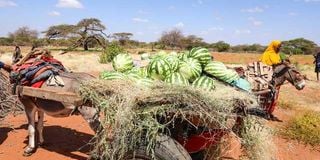Wajir farmer Salat Adan discovers gold in watermelons

Donkey carts are loaded with watermelons at Dahiya's farm in Elnur, Wajir County.
From a distance, this two-acre piece looks nothing more than a desolate mass of sand with scant vegetation and a huge acacia tree in one corner.
Upon closer inspection, the bounty from the land is hard to miss, evidenced by the loading of two donkey carts.
We meet 48-year-old Salat Dahiya Adan in Elnur, Eldas sub-County, about 15 kilometres north of Wajir town.
His workers have almost finished loading watermelons on carts for the market.
Even before the conversation begins, Adan welcomes our group of nine, each with a sizeable piece of fruit.
“For many years, like my father before me and his before him, I was a pastoralist,” he begins.
“I had 10 camels and 281 goats but due to scarcity of rain and grass, I moved with the animals to the mountains in the north.”
For years, Adan and his family led a nomadic lifestyle, going wherever animals had something to feed on.
That was until a five-year drought killed almost all his animals, leaving him with just 10 goats by the end of last year.
“I had never imagined tilling the land. Changing one’s lifestyle is not easy. With no options and a family of eight children, I had to do something drastic,” he says.
“I was excited when the Meteorological Department announced the coming of El-Niño rains.”
To lessen the impact of drought in Wajir, Save the Children International had identified 3,182 families to receive Sh13,500 each monthly for seven months till November 2023.
Adan’s family was among them. He saved part of the money.
“The money helped me set up the farm. I hired labour to clear the bush and fence,” he says.
“I then planted my first crop of watermelon.”
Unfortunately, the rains turned out to be a curse. What was supposed to be his lifeline was washed away by flood waters.

Salat Dahiya Hasan at his farm in Elnur, Eldas Sub-county, Wajir County on February 8, 2023.
“Based on the number of plants that had fruits, I estimated my losses to have been Sh300,000. I, however, knew there was no future in pastoralism. When the water finally cleared towards the end of November, I decided to give it another try,” he says.
The expenses were not much this time as Adan only needed to buy seedlings and plant again.
“I have made around Sh150,000, with one melon going for as much as Sh500,” he says.
“I sell to retailers, but the bulk of it goes to Wajir town.”
The money has enabled Adan to pay fees for two of his children in high school. The other six are still in primary school.
“I only need help in getting access to water as rainfall is not guaranteed here. I would also like to get more education and training on crop husbandry,” Adan says
With enough water, he hopes to begin producing pawpaw and tomatoes too.
Wajir is among the 23 arid and semi-arid land (ASAL) counties, based on the relatively low amounts of rainfall received.
Often marginalised and with a high rate of poverty, the 16 million people in these areas are mostly pastoralists and small-scale farmers.
ASALs are susceptible to droughts and floods. With the threat of climate change, these regions risk being reduced to deserts.
“Almost all stories about Wajir and neighbouring counties are negative. If not banditry and killings, it is about drought or flooding. There can be positive stories about our region too,” the farmer says.
“Even with other people’s intervention or assistance, one has to be industrious. Locals need to come up with solutions for sustainable livelihoods.”
Mohamed Noor Ali, a food security officer with Save the Children, says it is fulfilling to witness success stories like Adan’s.
“Calamities are temporary. For a lasting change, people need to be empowered. They should be willing to take sustainable ventures. It is important for people like Adan to be given support where necessary,” he says.
As we prepare to leave, Adan gives us more melons and is adamant that we do not pay “since you are his guests”.





